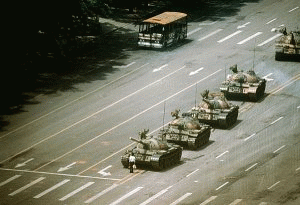Two Decades on, Continuing Censorship and Persecution of Survivors and Critics
(New York) - Twenty years after the Chinese army killed untold numbers of unarmed civilians in Beijing and other cities on and around June 3-4, 1989, the Chinese government continues to victimize survivors, victims' families, and others who challenge the official version of events, Human Rights Watch said today.
On May 13th, Human Rights Watch released "The Tiananmen Legacy," an assessment of the continuing impact of Tiananmen and a multimedia feature on the crackdown's 20th anniversary, which can be accessed at http://www.hrw.org/en/node/83112.
“The government's ongoing efforts to censor history, crush dissent, and harass survivors stands in stark contrast to the impressive economic and social developments in China in recent decades. The Chinese government should recognize that 20 years of denial and repression have only caused the wounds of Tiananmen to fester, not heal.” ~ Sophie Richardson, Asia advocacy director at Human Rights Watch.
The Chinese Communist Party initially justified its actions during the bloody crackdown as a necessary response to a "counter-revolutionary incident," later revising its characterization of the event as a "political disturbance."
"The government's ongoing efforts to censor history, crush dissent, and harass survivors stands in stark contrast to the impressive economic and social developments in China in recent decades," said Sophie Richardson, Asia advocacy director at Human Rights Watch. "The Chinese government should recognize that 20 years of denial and repression have only caused the wounds of Tiananmen to fester, not heal."
The Chinese government has always refused to provide a list of those killed, "disappeared," or imprisoned, and has failed to publish verifiable casualty figures.
The Tiananmen Mothers, a group of mothers and parents of students and civilian victims, has established a list of more than 150 people who were killed after the army opened fire on civilians. The government has also consistently quashed all public discussion of June 1989, while persecuting those who participated in the demonstrations or who publicly question the government's version of events.
Today, the detention of Liu Xiaobo represents the most visible symbol of the government's ongoing hostility to those involved in the 1989 protests and to any form of organized opposition.
One of China's best-known intellectual critics, Liu spent two years in prison for his role in supporting the Tiananmen students. Liu also prevented more bloodshed by successfully negotiating with the army the evacuation of the last remaining students on Tiananmen Square in the early morning of June 4. A regular interviewee of international media and scholars on June 4, Liu spent another three years in re-education-through-labor from 1996 to 1999 for a series of public calls questioning the one-party system, and was then put under a loose form of house arrest. On December 8, 2008, Liu was arrested once more on suspicion of being one of the organizers of a bold public petition for democracy and the rule of law titled Charter '08.
The text of Charter '08 included a direct reference to the June 4 events, as an example of the "long trail of human rights disasters" caused by the Communist Party of China's monopoly on power. Despite an international outcry, Liu continues to be held without charges.
"Liu Xiaobo epitomizes how the Chinese government has responded to Tiananmen in particular and peaceful critiques in general: by stifling them," said Richardson. "At the same time, Liu is emblematic of the tireless tenacity and courage of some Chinese citizens to fight for truth, justice, and democracy in the face of adversity."
Beginning in April 1989, workers, students, and others began to gather in Beijing's Tiananmen Square and in other cities. Most were demonstrating peacefully for a pluralistic political system. When the protests had not dispersed by late May, the government declared martial law, and then authorized the army to use lethal force to clear the streets of protesters. In the process of fulfilling that order, the army shot and killed untold numbers of unarmed civilians, many of whom were not connected to the protests. In Beijing, some citizens attacked army convoys and burned vehicles as the military moved through the city. Following the civilian killings, the Chinese government implemented a national crackdown and arrested thousands of people on "counter-revolutionary" charges, and on criminal charges including arson and disrupting social order.
(Note: You can view every article as one long page if you sign up as an Advocate Member, or higher).





